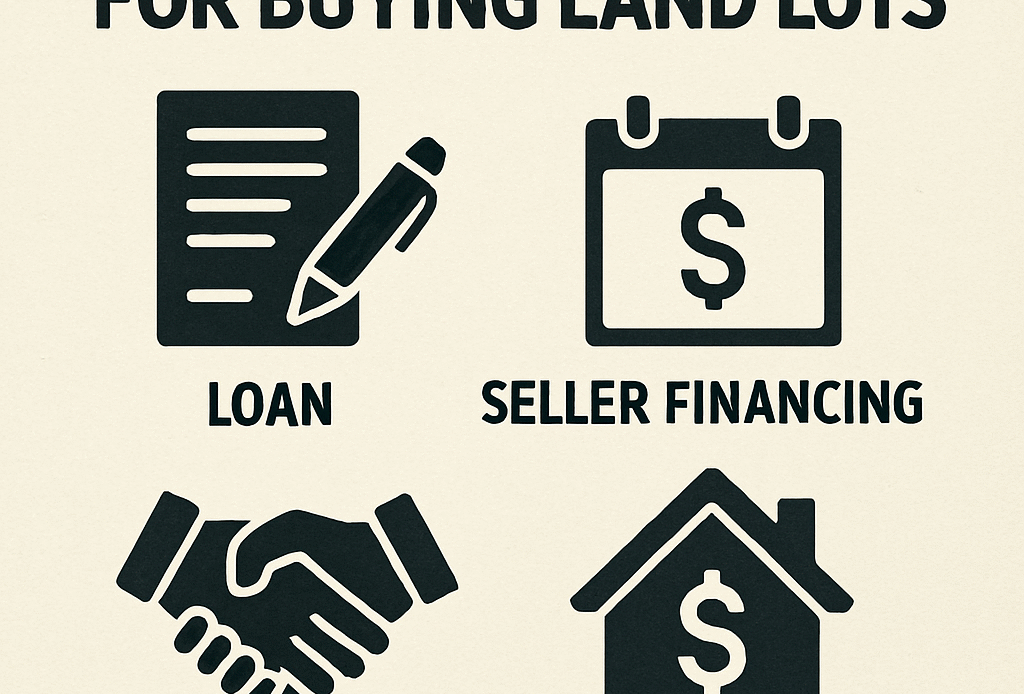When it comes to buying land, whether it’s a sprawling rural property, a cozy vacant lot, or a slice of farmland, understanding your financing options is essential. The process of purchasing land can be different from buying a home. This guide will walk you through the various financing options available for purchasing land lots and help you find the best approach for your needs.
Before diving into financing options, it’s crucial to understand the type of land you are interested in. Are you looking for vacant land with development potential, a rural plot for farming, or a lot with utilities ready for building? Each type of land may influence the financing options available to you.
Types of Land
- Vacant Land: These are undeveloped plots that have not been built on. They may or may not have access to utilities.
- Rural Land: Often used for agriculture, rural lands can be larger and may not have immediate access to city utilities.
- Residential Lots: These are plots within a community or subdivision, often with utilities in place for building a home.
- Commercial Land: Primarily used for business purposes, these plots can require different financing terms.
Traditional Land Loans
Traditional land loans are one of the primary ways people finance land purchases. However, they differ from standard home loans in several ways.
Down Payment and Interest Rates
Land loans typically require a higher down payment compared to home mortgages. Down payments can range from 20% to 50%, depending on the type of land and its intended use. Interest rates for land loans are usually higher due to the perceived risk.
Loan Terms
Land loans can have shorter repayment terms, often between two to five years. However, some lenders offer longer terms, especially if you plan to build on the land soon.
Seller Financing
Seller financing is another viable option for buying land, particularly if traditional financing is challenging to secure. In this scenario, the land seller acts as the lender.
Benefits of Seller Financing
- Easier Approval: Sellers may offer more flexible terms and may not require a high credit score.
- Negotiable Terms: Down payments, interest rates, and repayment schedules can be negotiated directly with the seller.
Considerations
- Higher Interest Rates: Seller financing can come with higher interest rates than traditional loans.
- Balloon Payments: Some agreements may require a large balloon payment at the end of the loan term.
Home Equity Loans
If you already own a home with significant equity, you might consider using a home equity loan to finance your land purchase.
How It Works
A home equity loan allows you to borrow against the equity in your home. You receive a lump sum that you can use to buy land.
Advantages
- Lower Interest Rates: Home equity loans often have lower interest rates compared to land loans.
- Tax Benefits: Interest on home equity loans may be tax-deductible.
Risks
- Secured Loan: Your home is collateral, so failure to repay the loan could result in losing your home.
Government Programs and Grants
For certain types of land, especially rural and agricultural properties, government programs and grants may be available.
USDA Loans
The U.S. Department of Agriculture offers loans for purchasing rural land. These loans typically have favorable terms, including lower interest rates and smaller down payments.
Considerations
- Eligibility Requirements: USDA loans have specific eligibility requirements, including location and income limits.
- Longer Approval Process: Government loans can take longer to process compared to traditional loans.
Exploring Land Auctions
Land auctions can be an exciting way to purchase land at a potentially lower price.
How Auctions Work
Land auctions can be conducted live or online. Properties are sold to the highest bidder, and payment terms are often cash or quick financing.
Benefits
- Potentially Lower Prices: Auctions can offer land at below-market prices.
- Variety of Options: Auctions provide access to various types of land, from vacant lots to large rural plots.
Considerations
- Quick Purchase: Auctions often require immediate payment or financing, so preparation is key.
- Due Diligence: Research the land thoroughly before bidding, as auction sales are typically final.
Tips for Finding the Right Land
by David Clode (https://unsplash.com/@davidclode)
Finding the right piece of land is as important as securing the right financing. Here are some tips to guide your search:
- Location Matters: Consider the location carefully, including proximity to amenities, schools, and workplaces.
- Check Zoning Laws: Ensure the land is zoned for your intended use, whether residential, agricultural, or commercial.
- Access to Utilities: Consider the availability of utilities like water, electricity, and sewage, which can affect development costs.
- Conduct a Land Survey: Hire a professional to survey the land to understand its boundaries and any potential issues.
Conclusion
Buying land is a significant investment, and understanding your financing options is crucial to making a sound decision. Whether you choose a traditional land loan, seller financing, or a home equity loan, it’s essential to evaluate each option’s pros and cons. Additionally, government programs and land auctions can offer unique opportunities for prospective landowners.
By considering your financial situation, the type of land you want, and your long-term goals, you can find the right financing option to make your land purchase a reality. Happy land hunting!




